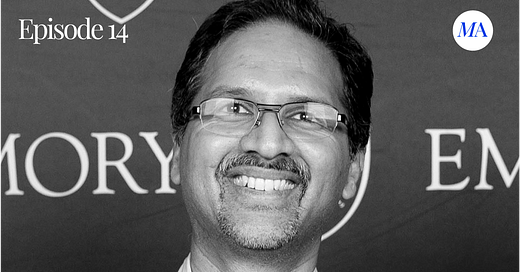Empathetic AI & Precision Medicine: Emory’s Dr. Anant Madabhushi on Revolutionizing Healthcare
A better way to diagnose & treat
Dr. Anant Madabhushi is the Robert W Woodruff Professor of Biomedical Engineering and is the founding director of the newly inaugurated Emory Empathetic AI for Health Institute. Dr. Madabhushi has authored over 500 peer-reviewed publications and has more than 100 patents issued or pending.
We covered what’s already possible and will soon be coming in the space of precision medicine, what it means for individuals and Atlanta collectively, and some of the ethical considerations that these developments present.
-
Episode overview:
Dr. Madabhushi covers the Emory Empathetic AI for Health Institute, which leverages artificial intelligence and routinely acquired medical data to advance precision medicine.
We explore the concept of precision medicine; how AI can help reduce overdiagnosis and overtreatment in healthcare by creating more granular risk assessments that lead to personalized and treatments, potentially saving patients from unnecessary procedures and financial burden.
The episode delves into the potential of AI to predict various health conditions, including Alzheimer's and cardiovascular events, through analysis of eye images.
We also covered ethical considerations and potential risks associated with AI in healthcare, including issues of what information a patient should have access to, equity, and the need for rigorous validation of AI tools.
Finally, Dr. Madabhushi shares his vision for the future and his belief that Atlanta will become a leading center for innovation in this field, enabled by our city’s diverse patient population and strong academic institutions.
🧠 Big Question:
If AI could predict you'd have a fatal disease within 10 years, would you want to know?
Dr. Madabhushi shared that AI analysis of routine eye scans can reveal whether you have Alzheimer’s today, along with predictive risk for many health conditions & types of cancer.
This capability raises serious ethical questions about how to communicate such information to patients without making it feel like clinicians are delivering an AI death sentence.
There is a significant difference between actionable insights (e.g., risk of heart disease that can be mitigated through lifestyle changes) and predictions about unavoidable conditions.
I subscribe to the notion that knowledge is power, though something feels odd about predicting your mortality. If I knew I likely had seven years to live before a glioblastoma, I might make decisions that would help me maximize those seven years.
In some ways this feels like an unanswerable rhetorical question, soon we’re going to have to determine what information we want and why.
-
💡 Bold Idea:
Atlanta can be the global epicenter for AI-enabled precision medicine
Atlanta offers a unique combination of assets that enable precision medicine
Premier research universities
Significant healthcare and biomedical talent
A thriving business climate
A diverse patient population crucial for training comprehensive AI solutions
The last point is an important differentiator. If an AI algorithm is trained on a dataset that’s too heterogenous, it can lack fidelity across different populations of patient groups.
Atlanta’s large Black population and international communities enable us to train AI programs and solutions that could change healthcare administration across the country and the world.
If we capitalize, it's going to not only increase quality of life through better healthcare, but also create real opportunities for Atlantans to be a part of commercializing, building businesses, and scaling these solutions to global audiences.
-
🎯 Better Living
Precision medicine will save lives and dollars through smarter diagnoses
Overdiagnosis is a significant problem in healthcare, often leading to unnecessary, costly, and potentially harmful treatments.
Dr. Madabhushi shared a statistic: 1 in 7 men in the U.S. are diagnosed with prostate cancer, but only 1 in 40 die from it, highlighting the need for discernment in what invasive treatments we opt into.
Even more alarming, 42% of cancer patients in the U.S. spend their life savings within 1-2 years of diagnosis, often due to unnecessary treatments.
AI-powered precision medicine could help identify which patients truly need aggressive treatments, potentially saving lives while reducing financial strains and improving overall healthcare efficacy. Sign me up!
—
Resources for those wanting to learn more:
Book "The Emperor of All Maladies" by Siddhartha Mukherjee
—
Questions for reflection:
Would you want to know if AI could predict a fatal diagnosis for you within the next decade?
How might the ability to predict diseases years in advance change insurance products? Is that ethical?
-
Once again, please find the episode linked here:





